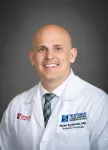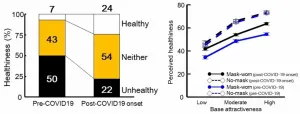(Press-News.org) A new study published online today in the Journal of the National Cancer Institute reports that one third of the most popular cancer treatment articles on social media contain misinformation. Further, the vast majority of that misinformation has the potential to harm cancer patients by supporting approaches that could negatively impact the quality of their treatment and chances for survival. The study also showed that articles containing misinformation garner more attention and engagement than articles with evidence-based information.
The internet is a major source for health information, and misinformation is growing among many types of health conditions. This is an urgent challenge because it can result in patients making decisions detrimental to their survival or outcomes.
Skyler Johnson, MD, Huntsman Cancer Institute (HCI) physician-scientist and assistant professor of radiation oncology at the University of Utah (U of U), headed the study. Johnson's interest in this area was piqued after work he completed earlier in his career showed higher risk of death among patients who used unproven approaches to treat cancer as an alternative to conventional, evidence-based treatments. That research led Johnson to several discussions with patients, physicians, researchers, and journalists. In the course of these conversations, Johnson found a recurring theme about the role that online media, particularly social media, played in disseminating inaccurate cancer information. Further, in his clinical practice at HCI where he cares for people with cancer, Johnson often heard from patients who had questions about articles they saw on social media.
He and the research team set out to better understand the quantity and nature of cancer information on social media. The research team included experts in cancer care, health outcomes, and communications. They convened medical expert panels to review and assess the claims presented in 200 of the most popular articles on social media sites. For this study, the researchers focused on articles related to breast, prostate, lung, and colorectal cancers.
"We found misinformation is clearly prevalent in cancer articles on social media, and the vast majority of those pieces contain harmful information," says Johnson.
The team's findings showed just how common it is for cancer patients to receive misinformation. Of 200 articles analyzed, 33% contained misinformation. Of those, 77% contained information that could negatively influence patient outcomes. Johnson noted that after reviewing articles, he has major concerns about how one could distinguish between which articles are reliable and which are not.
Johnson says he understands why patients seek information online, including through social media platforms. "Having cancer is a unique and vulnerable situation. Patients are dealing with a new disease. They want to feel in control over their own health and do everything possible to maintain hope. They experience a deluge of new information as they are diagnosed, including through social media. Some patients seek out information, and some information is shared with patients by well-intentioned family and friends."
He advocates for physicians to maintain open communication channels with their patients. In his practice, he lets patients know they are likely to encounter misinformation about their cancer online. He encourages his patients to talk to him if they have questions about information they see related to their cancer online or through social media.
Johnson hopes that this research is just the start. He wants to identify predictors of misinformation and harm on social media in order to help physicians and patients better understand and navigate this challenging issue.
"We need to address these issues head on," Johnson says. "As a medical community, we can't ignore the problem of cancer misinformation on social media or ask our patients to ignore it. We must empathize with our patients and help them when they encounter this type of information. My goal is to help answer their questions, and provide cancer patients with accurate information that will give them the best chance for the best outcome."
INFORMATION:
Johnson acknowledges the critical efforts of the entire study team, including senior author Angela Fagerlin, PhD, HCI cancer researcher and professor and chair of population health sciences at the U of U; Jonathan Tward, MD, PhD, HCI physician-scientist and professor of radiation oncology at the U of U, who organized the process of conducting medical expert reviews of the articles; and Laura Scherer, PhD, a misinformation researcher at the University of Colorado School of Medicine. The research was funded by the National Institutes of Health/National Cancer Institute P30CA042014 and Huntsman Cancer Foundation.
Public resource note: Huntsman Cancer Institute's Cancer Learning Center is a free service for health professionals and members of the public who have cancer questions, including questions about articles they may see on social media. It can be reached toll free at 888-424-2100 or email cancerinfo@hci.utah.edu. Services are available in English and Spanish.
About Huntsman Cancer Institute at the University of Utah
Huntsman Cancer Institute (HCI) at the University of Utah is the official cancer center of Utah. The cancer campus includes a state-of-the-art cancer specialty hospital, community clinics, a mobile screening program, and two buildings dedicated to cancer research. HCI treats patients with all forms of cancer and is recognized among the best cancer hospitals in the country by U.S. News and World Report. As the only National Cancer Institute (NCI)-Designated Comprehensive Cancer Center in the Mountain West, HCI serves the largest geographic region in the country, drawing patients from Utah, Nevada, Idaho, Wyoming, and Montana. More genes for inherited cancers have been discovered at HCI than at any other cancer center in the world, including genes responsible for hereditary breast, ovarian, colon, head, and neck cancers, along with melanoma. HCI manages the Utah Population Database, the largest genetic database in the world, with information on more than 11 million people linked to genealogies, health records, and vital statistics. HCI was founded by Jon M. and Karen Huntsman.
Levels of omega-3 fatty acids in the blood are as good a predictor of mortality from any cause as smoking, according to a study involving the Hospital del Mar Medical Research Institute (IMIM), in collaboration with The Fatty Acid Research Institute in the United States and several universities in the United States and Canada. The study, published in The American Journal of Clinical Nutrition, used data from a long-term study group, the Framingham Offspring Cohort, which has been monitoring residents of this Massachusetts town, in the United States, since 1971.
Researchers have found that omega-3 levels in blood erythrocytes (the so-called red blood cells) are very good mortality risk predictors. The study concludes that "Having higher levels of these ...
Some antibiotics appear to be effective against a form of skin cancer known as melanoma. Researchers at KU Leuven, Belgium, examined the effect of these antibiotics on patient-derived tumours in mice. Their findings were published in the Journal of Experimental Medicine.
Researchers from KU Leuven may have found a new weapon in the fight against melanoma: antibiotics that target the 'power plants' of cancer cells. These antibiotics exploit a vulnerability that arises in tumour cells when they try to survive cancer therapy.
"As the cancer evolves, some melanoma cells may escape the treatment and stop proliferating to 'hide' from ...
An international collaborative study led by University of Helsinki has conducted a holistic study to investigate the effects of COVID-19 restrictions on several air quality pollutants for the Po Valley region in northern Italy. The area is well known to have one of the worst air quality standards in Europe and is highly influenced by anthropogenic (human-led) activities. The study was done between research groups in Finland, Italy and Switzerland and the results were published in the journal Environmental Science: Atmospheres.
Scientists have combined air quality measurements and computer simulation data over several locations in the region. The resulting studies show that reduced emissions from traffic lead to a strong reduction of nitrogen ...
Targeted removals can be effective in suppressing the number of invasive lionfish found within protected coastlines around the Mediterranean Sea.
However, if they are to really be successful they need to be combined with better long-term monitoring by communities and conservationists to ensure their timing and location achieve the best results.
Those are the key findings of a new study, one of the first of its kind to examine the effectiveness of targeted lionfish removals from both an ecological and a socio-economic perspective.
Scientists working as part of the European Union-funded RELIONMED project ...
The Covid-19 pandemic has improved perceptions of facial attractiveness and healthiness of people wearing face masks in Japan.
Wearing sanitary facemasks was not uncommon in Japan prior to the Covid-19 pandemic. Public health initiatives during the pandemic have led to a drastic increase in the use of facemasks as they reduce the transmission of the SARS-CoV-2 virus. The sanitary-mask effect is a model that predicted how facemasks affected perceptions of facial attractiveness. However, as mindsets might have changed due to the pandemic, it is likely that the sanitary-mask effect has been altered.
A team of four scientists, including Professor Jun I. Kawahara from Hokkaido University's ...
Pregnant women in South East Asia are more likely to use smokeless tobacco than non-pregnant women, despite the added risk of foetal harm during pregnancy.
The study - from the University of York - also suggests that there is no difference in smoking between pregnant women and non-pregnant women in many lower to middle income countries.(LMICs)
Researchers analysed data from 42 lower to middle income countries (LMICs) and also conducted a separate sub-group analysis for the South East Asia Region. (SEAR)
Researchers said the study is the first to report comparative estimates of tobacco use among pregnant and non-pregnant women from the 42 LMICs encompassing 80,454 pregnant and 1,230,262 non-pregnant women.
Dr Radha ...
Results from a new survey of astronomers and geophysicists show that these sciences have a systemic bullying problem; one that is disproportionately worse for women and those from minority groups. In a survey carried out by the Royal Astronomical Society (RAS) last year of over 650 people in the field, 44% of respondents had suffered bullying and harassment in the workplace within the preceding 12 months. Aine O'Brien, RAS Diversity Officer, will present the key results in a talk at the virtual National Astronomy Meeting on Thursday 22 July.
Key initial findings show:
Disabled, and Black and minority ethnic astronomers and geophysicists are 40% more likely to be bullied than their non-disabled and White colleagues respectively.
Women and non-binary people in the field are 50% more ...
Remote 24-hour monitoring for cancer patients receiving chemotherapy helps to better manage side effects and improve quality of life, finds a study published by The BMJ today.
The researchers say remote monitoring can provide a safe, secure, and "real time" system that optimises symptom management and supports patients to remain at home - and is particularly relevant in the context of the covid-19 pandemic.
Effective symptom monitoring and management is essential during chemotherapy for cancer, but current approaches rely on patients recognising that symptoms are severe ...
Two years on from its pledge to make England smoke free by 2030, the UK government has failed to deliver on the policies it promised to deliver this ambition, say a group of leading doctors, professional bodies and charities in The BMJ today.
In an open letter to the Prime Minister and Secretary of State for health, they say smoking is likely to have killed more people last year than covid-19 and it will carry on doing so for many years to come unless the government takes action.
They call for a US-style 'polluter pays' levy on tobacco manufacturers to fund the strategy, saying "the time has come to make the tobacco manufacturers pay to end the epidemic they and they alone have caused."
The rate of decline in smoking in the years leading up to 2019 was not sufficient to deliver ...
A new approach to analysing the development of magnetic tangles on the Sun has led to a breakthrough in a longstanding debate about how solar energy is injected into the solar atmosphere before being released into space, causing space weather events. The first direct evidence that field lines become knotted before they emerge at the visible surface of the Sun has implications for our ability to predict the behaviour of active regions and the nature of the solar interior. Dr Christopher Prior of the Department of Mathematical Sciences, Durham University, will present the work today at the ...



